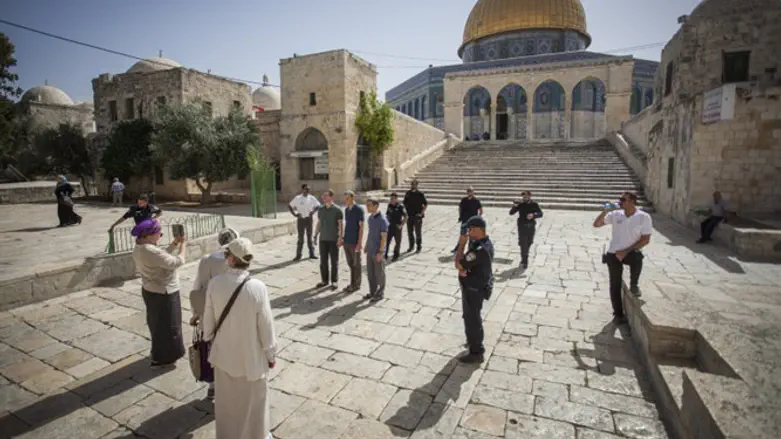
Under the headline "Don't settle for the Wall," a new initiative was launched by the Students for the Temple Mount movement, which seeks to bring Bar Mitzvah boys to the site to celebrate the special day.
In an interview with Arutz Sheva, Maayan Magen, the organization's spokeswoman, talks about the project and what is behind it. "We all know of the Bar Mitzvah celebrations at the Kotel, and many families come to celebrate there and hold a tefillin ceremony and a Torah ceremony with musicians, etc. It would be well and fine if it was not part of the myth that gave the Wall a central place in Jewish consciousness. We want to focus attention back to the Temple Mount."
Magen continues and notes that many want to experience the special day in a significant fashion and "it is important that they go up a level and have a different and meaningful experience. And it is important for us to change the perception."
Magen was asked whether Bar Mitzvah age is the right age to experience the delays at the entrance to the mountain, the accompanying Wakf, the Muslim aggression on the Mount, the restrictions on Jews, and more. According to her, the current reality on the mountain has changed and things are simpler today than in the past, even if it is not yet a completely positive reality. "It's a bit simpler now; things have changed in waiting at the entrance to the mountain and the Morbittat [screaming Arab women] have been removed from the mountain. We are in the midst of a struggle over the Mount." However, she adds, "things depend on the willingness of the family and on the family's understanding that it will not be the easiest but it will be very joyous and exciting and very successful."
"The Temple Mount is not a political place, it's the purest and most holy place where you can have a very good experience," she says. "There are young children who go up to the mountain with proper guidance and are very excited about the place of the Temple. Many have already ascended with no problem," she says.
Perhaps, Magen was asked, all the publicity, even of Arutz Sheva, about the difficulties on the Temple Mount present an obstacle to an initiative such as the one she is currently promoting, after the public is accustomed to hear that ascending to the Temple Mount involves confrontation with Muslims and Waqf members, restrictions and discrimination against Jews. Magen makes it clear that despite everything she says about the relative ease of going up to the mountain, "it's not all right, everything is far from right, and it's important to raise awareness of the absurdity of the restrictions on Jews on the Mount. It does not contradict that you can go up and experience other things and you can connect from another experience."
About her target audience, Magen explains, "The first people we turn to are the ones who are more connected to the subject, but it's widening," she says, adding: "Traditional families and those who want to connect to a place of holiness and importance are joining. Traditional and religious families will join in. There have already been several requests," she reports.
And what exactly does the package include, the initiative that is organized and staffed by volunteers from the Students for the Temple Mount? Magen describes a reception with live musicians for the Bar Mitzvah and his family at the entrance to the Temple Mount, where the aliya to the Torah takes place and the boy puts on tefillin with a Torah scroll that will be brought to the entrance to the Mount, where a table similar to ones at the Temple Mount plaza will be installed. Then, "the boy goes up with the family to the Mount after proper preparation, with close guidance, and then on the descent from the mountain, we receive him with much joy, and then according to the family's choice - a tour of the Temple Institute or a restaurant or anything else happening at the Western Wall plaza."
And what about the police and the authorities? "They will know of the project," she says, convinced that there should be no problem on the part of the police or various authorities in waiting to enter the Mount and leading the entire project. What about the Waqf? Magen does not sound particularly deterred, "I do not know what they will do, we are connecting to our holy place and will not let go of it."
Toward the end of her remarks, Magen stresses that this is not a project aimed at harassing or pestering anyone but rather "bringing the people back to the right place."